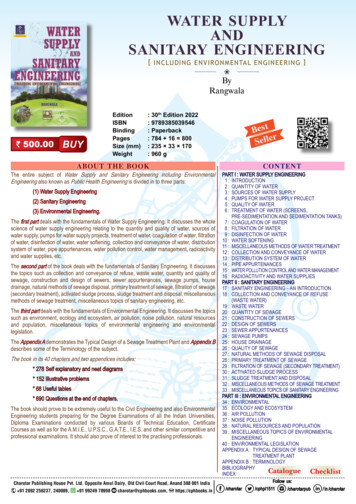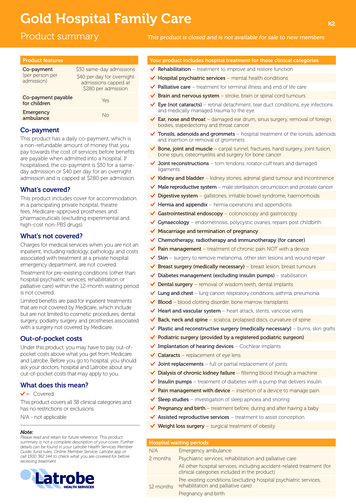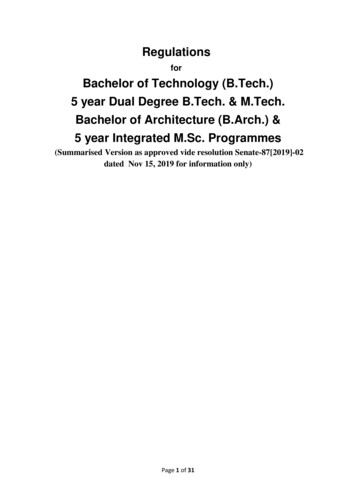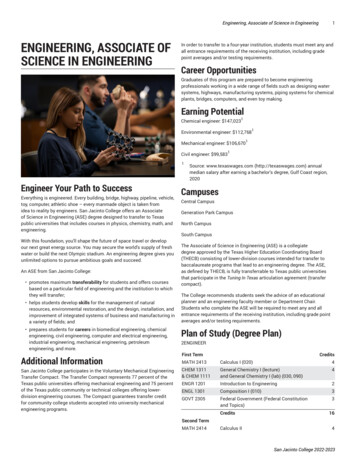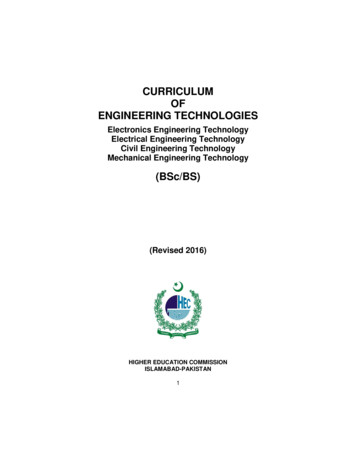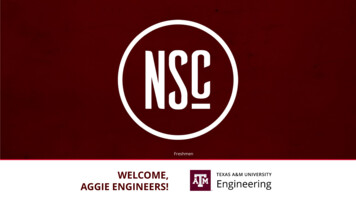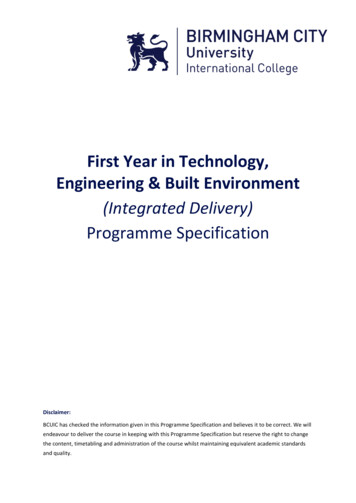
Transcription
First Year in Technology,Engineering & Built Environment(Integrated Delivery)Programme SpecificationDisclaimer:BCUIC has checked the information given in this Programme Specification and believes it to be correct. We willendeavour to deliver the course in keeping with this Programme Specification but reserve the right to changethe content, timetabling and administration of the course whilst maintaining equivalent academic standardsand quality.
Pathway Programme InformationPathway TypeUndergraduatePathway AreasTechnology, Engineering and EnvironmentPathways/sNAVIGATE Code/sFirst Year Degree inTechnology (Computing)UGTEPathway ProvisionCollege: NQF Level/s: 4TitleFirst Year Degree in Technology, Engineering and EnvironmentNQF (FHEQ)4Credit PointsTwo (2 ) Semester 120Duration of StudyTwo (2) semestersWeeks of StudyTwo (2 ) Semester thirty three (33) weeksMode of StudyFull-timeMode of DeliveryFace to FaceNotional HoursTwo (2 ) Semester 1,350Contact HoursTwo (2 ) Semester 450Self-directed Study HoursTwo (2 ) Semester 900Delivery ModelIntegrated Delivery Model (IDM)Teaching InstitutionAwarding InstitutionBirmingham City University International College & Birmingham CityUniversityBirmingham City UniversityFacultyComputing, Engineering and Built Environment (CEBE)Teaching Location(Campus)2-semester intakeBCUIC, 15 Bartholomew Row, Birmingham B5 5JUCurzon St, Birmingham B4 7XGSeptemberSubject BenchmarksStatementsQAA: tatements/sbsengineering-15-masters.pdf?sfvrsn fb91f681 16 statements/sbsengineering-15-masters.pdf?sfvrsn fb91f681 16First Year Degree inEngineeringUGENFirst Year DegreeBuilt EnvironmentUGBE
Stage(s) of StudyBCUICBCUICBCUBCUStage 1Foundation YearStage 2Stage 3Stage 41st year Degree2nd Year Degree3rd Year DegreeArticulation ProgrammesPathwayDegree awardsBuilt EnvironmentBSc (Hons) Architectural TechnologyBSc (Hons) Building SurveyingBEng (Hons) Civil EngineeringBSc (Hons) Construction ManagementBSc (Hons) Quantity SurveyingBSc (Hons) Real EstateEngineeringMEng/BEng (Hons) Automotive EngineeringMEng/BEng (Hons) Mechanical EngineeringMEng/BEng (Hons) Electronic EngineeringTechnologyMSci/BSc (Hons) Computer Networks and SecurityMSci/BSc (Hons) Computing and Information TechnologyMSci/BSc (Hons) Computer Games TechnologyMSci/BSc (Hons) Computer ScienceMSci/BSc (Hons) Digital ForensicsBSc (Hons) Digital Media ComputingBSc (Hons) Sound Engineering and ProductionBSc (Hons) Music TechnologyBSc (Hons) Business Information TechnologyFHEQ AwardLevel666666777777776666BSc (Hons) Digital Film Production6BSc (Hons) Visual Effects6
First Year in Technology, Engineering & Built Environment (Two Semesters)First Year in Technology, Engineering & Built EnvironmentCore ModulesContactCollegeModule NameHrs/Week ModuleCodeCreditPassPointsMark %1550Exam %Coursework%Semester 14ILSCTEInteractive Learning Skills and4060CommunicationFor subject modules per degree, visit the individual degree pages via the links below and select the‘Course in Depth’ tab.Built EnvironmentBSc (Hons) Architectural TechnologyBSc (Hons) Building SurveyingBEng (Hons) Civil EngineeringBSc (Hons) Construction ManagementBSc (Hons) Quantity SurveyingBSc (Hons) Real EstateEngineeringMEng/BEng (Hons) Automotive EngineeringMEng/BEng (Hons) Mechanical EngineeringMEng/BEng (Hons) Electronic EngineeringTechnologyMSci/BSc (Hons) Computer Networks and SecurityMSci/BSc (Hons) Computing and Information TechnologyMSci/BSc (Hons) Computer Games TechnologyMSci/BSc (Hons) Computer ScienceMSci/BSc (Hons) Digital Forensics
BSc (Hons) Digital Media ComputingBSc (Hons) Sound Engineering and ProductionBSc (Hons) Music TechnologyBSc (Hons) Business Information TechnologyBSc (Hons) Digital Film ProductionBSc (Hons) Visual EffectsStrategic Rationale for the ProgrammeThe partnership between Birmingham City University International College (BCUIC) and BirminghamCity University (BCU) facilitates the acquisition of Select level degree by international students who,because of their previous educational experience, are not normally able to gain direct access to theUniversity’s degree schemes. The programme has therefore been developed to satisfy importantpedagogical issues:1. To ensure that international students have a dedicated period of time, in a familial and safesetting, to adjust to and acquire the skills to prepare for further studies within a western learningenvironment.2. To satisfy the University’s quality protocols, which in turn are directed by the QAA SubjectBenchmark requirements, for articulation purpose.3. Facilitate access to a programme leading to a University degree award.4. Widen access and participation in higher education in line with the University’sinternationalisation agenda.5. Commit to the provision of best practice customer service and student experience forinternational students and thus add value to the University’s award-winning student lifestyle.6. Support the integrity of the University’s QAA commitment by adopting and adapting theUniversity’s quality regime to form the basis of a robust, quality driven academic provision andadministrative systems and processes.7. Assist in the diversification of the student body.
Educational AimsThe programme, First Year in Technology, Engineering and Built Environment, has been developed inaccordance with Navitas UK general educational aims along with those formulated for the College andthe nominated outcomes desired by Birmingham City University, Faculty of Computing, Engineeringand Built Environment, (CEBE) to impart a high quality of education in the disciplines required.The educational aims of the programme are to:1.Prepare students, who would not normally be considered qualified, to an appropriatestandard for entry into the prescribed Birmingham City University degrees at FHEQ Level 5 within theSchool of Birmingham School of the Built Environment (CEBE).2.To endow each individual with an educational pathway that augments opportunities forprofessional employment and development in built environment at both a national and internationallevel.3.Develop in students a fundamental knowledge and understanding that can demonstrate anunderstanding of the technological related factors in their chosen sector so as to support their transferon successful completion therein into Birmingham City University prescribed degrees schemes atFHEQ Level 5 within the School of Birmingham School of the Built Environment (BSBE).4.Develop in students an appreciation and desire to learn based on competent intellectual andpractical skills building to a set of transferable skills that will support them in all aspects of theironward academic studies/careers and assist informed decision-making.5.Ensure that students have attained the prescribed level of inter-disciplinary languagecompetence described as Level B2 ‘Independent User’ by the Council of Europe, see CommonEuropean Framework of Reference for languages: Learning, teaching assessment 2001, Council ofEurope, CUP, Cambridge, p. 24, Table 1. Common Reference Levels: global scale.6.Ensure that graduates have attained the prescribed level of inter-disciplinary languagecompetence to a minimum pass mark of 50% in the ACL accredited module Interactive Learning Skillsand Communication, and therein a minimum 6.5 IELTS equivalent.
Intended Learning OutcomesGeneric: All modules have a set of Learning Outcomes (LOs) attached to them; see relevant DefinitiveModule Documents (DMDs). These provide a basic set of core transferable skills that can be employedas a basis to further study and life-long learning. They are delivered using an interdisciplinary andprogressive approach underpinned by the relevant module, to build these core skills within thecontext of subject-specific learning. Incorporated in these core skills are the key themes ofrelationship-management, time-management, professional communication, technological andnumerical understanding and competency.For full details, see the programme Moodle iew.php?id 4983)
Learning and Teaching StrategyBCUIC Learning and Teaching Strategy is informed by a variety of stakeholders including students.To be a values-driven partner to BCU representing an academically excellent community of learninginformed by the Navitas ethos. Our students have diverse starting points and therefore our corephilosophy is that we will engage with them as partners and together provide an education that willmaximise their chances of achieving excellent outcomes.The Strategy therefore encompasses pedagogy and provision, curriculum, delivery, e-learning, studentaffairs, professional development, reporting, monitoring and review, quality and standards.The Strategy is reflective of both current and informed good practice alongside future aspirations,aims and objectives. Keeping the Strategy current, and therefore relevant, is essential to theachievement of the desired long-term aims for BCUIC students.The aim of the BCUIC’s Learning and Teaching Board is to ensure openness and transparency in allmatters concerning the student learning experience and academic performance standards. TheLearning and Teaching Board is responsible to Navitas Learning and Teaching Committee for reportingon the maintenance, development and enhancement of high academic standards and an excellenttaught student learning experience.The acquisition of learning outcomes is via a combination of small group lectures, small group-basedtutorial coursework (oral and written presentation) and individual coursework (oral and writtenpresentation) and summative examination. Application of the central programme themes throughoutall core modules of the stage of study via examples and topics for assessment regimes. Additionalsupport is provided through the provision of small peer-led tutorial group work; the addition ofindividual tutorial support; BCUIC module specific subject specialists delivering modules; guestspeakers (industry/topic specific); monitoring and appraisal by BCUIC academic management as wellas Navitas Ltd (UK) management.Students are encouraged throughout the stage of study to undertake independent study both tosupplement and consolidate what is being taught/learnt and to broaden their individual knowledgeand understanding of the subject. This can be through the use of the University’s library and IT facilitiesfor self-directed study and to use their private IT facilities where possible.
Assessment StrategyThe programme is compliant with both the generic assessment regulations of Navitas UK and those ofthe university. See BCU Academic Regulations: Assessment, Progression and Award.Each module within the programme/stage of study has an associated Module Outline that may bebroadened into a Module Guide (MG) either of which will be provided to students at the beginning oftheir studies. These documents offer generic information on the Aims and Specific LOs of the subject/sunder study, basic references and the attendance and notional contact requirements. They alsoinclude topics/subject areas of study and outlines of the assessment events.Each module has an associated textbook, as prescribed by the University’s Module Outlines whichincludes the types of assessment activities employed, teaching methods, resources, assessmentcriteria and expectations, contact details of the tutor/s, referencing (if applicable) andsubmission/completion requirements. All assessment is designed to reflect and measure both anindividual’s and a cohort’s achievement against the Specific LOs of the module and Intended LOs ofthe programme.In-course written, reading, listening and oral assessment is built into all modules through generalinteraction between tutors and students, student peer review and small group tutorials or individualtutorials/appraisals. Modes of assessment include essay/report writing, oral presentation (group orindividual, and poster), portfolio, and e-based, in-class or take-home exercises/tests.All written assessments must follow certain criteria in style and submission as noted in the relevantModule Outlines and Student Guide. This form of assessment is considered fundamental to astudent’s ability to communicate ideas and evidence with clarity, relevance and logic in a planned andorganised manner. Plain writing style, syntax and grammar are core skills that can be enhanced tosupport the maturing of individual students’ composition and thus academic and transferableproficiency.Oral presentations, whether part of formal or informal assessment practice, are encouraged within allmodules as they promote, among others, transferable skills and can identify those students who maybe plagiarising material. It is advised, however, that they should not make up more than 60% of thefinal module mark unless as part of the learning rational. Oral group presentations should ideally
contain no more than five (5) students, unless specific reasoning is applied. Each member, irrespectiveof their role, should be awarded the same mark unless where obvious differentiation arises, formanagement of this process. Time limits must be upheld by tutors so as to ensure all students havethe same opportunity to perform. Furthermore, tutors ought to notify students as to the materialsavailable to them before preparation takes place.Final summative examination normally adheres to closed-book, invigilated, timed conditions and takesplace during allocated exam periods of a programme. It represents a more Abstract measure of astudent’s achievement as a consequence of the Specific LOs associated with a module. It is utilised asa key measure of quality in teaching standards and provides a basis to aspects of delivery andenvironment, which takes place at the conclusion of a semester by College academic services, see BCUSENATE REGULATION. Marks indicated in the relevant MG’s cannot be referred. Only in extenuatingcircumstances, sickness, and personal tragedy or in the possibility of a clerical error, will deferral takeplace, see BCU assessment regulations. 091018131840772710522149.pdf)Moderation, Progression and Award RequirementsThis programme is delivered in two semesters full-time. Both the delivery and assessment of theprogramme is in English. The mode of delivery is standard delivery mode.A subject specialist within the College moderates a ten percent sample of each assessment. Link tutorsfrom the Birmingham University and University appointed external examiners are invited to reviewthese samples.Each module offered on the programme has a minimum overall pass mark. Please refer to definitiveModule Guide (DMD). The College’s Policy and Regulation (CPR) 9 explains all our assessmentregulations for further details on the assessment regulations and failing to 406f811f173b9935de20.ssl.cf6.rackcdn.com/BCUIC Assessment update.pdf)
Categories of PerformanceA (High Distinction, 80 - 100%) – Distinctive level of knowledge, skill and understanding whichdemonstrates an authoritative grasp of the concepts and principles and ability to communicate themin relation to the assessment event without plagiarism or collusion. Indications of originality inapplication of ideas, graphical representations, personal insights reflecting depth and confidence ofunderstanding of issues raised in the assessment eventB (Distinction, 70 - 79%) – Level of competence demonstrating a coherent grasp of knowledge, skilland understanding of the assessment and ability to communicate them effectively. Displays originalityin interpreting concepts and principles. The work uses graphs and tables to illustrate answers whererelevant. Ideas and conclusions are expressed clearly. Many aspects of the candidate’s application andresult can be commended.C (Credit, 60 - 69%) – Level of competence shows an acceptable knowledge, skill and understandingsufficient to indicate that the candidate is able to make further progress. The outcome showssatisfactorily understanding and performance of the requirements of the assessment tasks.Demonstrates clear expression of ideas, draws recognisable and relevant conclusionsD (Pass, 50 - 59%) – Evidence of basic competence to meet requirements of the assessment task andevent. Evidence of basic acquaintance with relevant source material. Limited attempt to organise andcommunicate the response. Some attempt to draw relevant conclusionsE (Pass 40- 49%) – The candidate’s application and result shows that the level of competence beingsought has just been achieved. The assessed work shows an acceptable grasp of knowledge, skill andunderstanding of the requirements and communication of the assessment event and associated tasksF (Fail 0- 39%) – The candidate’s application and result shows that the level of competence beingsought has not yet been achieved. The assessed work shows a less than acceptable grasp ofknowledge, skill and understanding of the requirements and communication of the assessment eventand associated tasksNB: See individual Module Guides for details marks classificationProgression Criteria: minimum pass mark of 40% achieved for all modules listed bar: ILSC, whichrequires a minimum pass mark of 50% achieved in all assessment events.
School of Birmingham School of the Built Environment (CEBE). 2. To endow each individual with an educational pathway that augments opportunities for professional employment and development in built environment at both a national and international level. 3. Develop in students a fundamental knowledge and understanding that can demonstrate an


